Choosing a Heater for an Enclosed Trailer: Factors
When trying to select the best heating option for your cargo trailer, there are several factors that you need to consider. Let’s take a closer look at each of these, and discuss why it is important to find a heater that meets all of these individual requirements.Trailer Size
Of course the size of the trailer is one major determining factor that will play a role in how well a heater heats your trailer.Naturally, larger trailers will require larger and more effective heaters than a small trailer would need. Before choosing a heater specifically for this use you should try and determine approximately how much heat you will need to produce to warm your trailer size.While there are formulae that you can use to theoretically calculate how much heat energy you need to produce in order to consistently and successfully heat your trailer, practical knowledge is best in this instance.If at all possible, try to borrow or rent a heater before purchasing one. Even if that means simply borrowing an electric heater to give you an idea of how large a heater you will require.If the heater that you borrow turns out to be insufficient for heating your space, then you know that you need something larger when you make a purchase.BTUs as a Tool
While it is a British form of measurement, British Thermal Units (BTU) are a useful tool in this case. Electric heaters work in kilowatts, and there are basic ratings in BTU available for propane and wood heaters online.Since 1 Kw is equivalent to 3414 BTU/hr, you can easily convert the electric total of your borrowed electric heater to a BTU value you can use when trying to determine what size propane or wood heater to buy.You can also opt to use a BTU calculator to help you determine the amount of heat you need to produce to heat your trailer.Trailer Insulation
Of course, another essential factor to consider, in addition to the size of the trailer, is how well the trailer is insulated.A well-insulated large trailer can easily consume considerably less heat energy than a badly insulated small trailer. When trying to determine whether you need a large heater or a small heater, stop to check and consider the insulation levels.If your trailer is badly insulated, or not insulated at all, it’s well worth considering installing insulation before purchasing a heater. Not only will this cut down on the size of heater that you need, but it will significantly cut down on how much you spend trying to heat the trailer effectively.There are several distinct factors that you need to consider when choosing an insulation type and deciding whether your insulation is effective for your trailer. These include the following:- The insulation material – contrary to popular belief, not all kinds of insulation are equal. They are rated using a system called the R rating. The higher the rating, the better the insulative value of the material. Opt for the highest rating that you can afford.
- The insulation coverage – ensure that you cover as many parts of the trailer as possible with insulation, including the walls, ceiling, and floor of the trailer.
Pro Tip!
It is possible to insulate windows as well. If your trailer has windows, consider purchasing double pane glass with a layer of insulative air between the layers. Windows have R ratings, too, and the higher the rating, the less heat will be required.
- The insulation sealing – one of the biggest mistakes many people make is forgetting to seal the insulation properly. The more gaps and unsealed areas there are within your trailer, the less effective the installation will be. Ensure that you seal (with a proper insulated material like caulking) all of the joints and any gaps within the trailer that may leak heat.
Ventilation
One often overlooked aspect that absolutely must be considered when choosing a heater for an enclosed trailer is ventilation.
If your trailer does not have any shape or form of ventilation, you cannot safely use a wood or gas heater.
Is it still possible to use these heaters in a cargo trailer? Absolutely. However, you must ensure that you install adequate ventilation along with the heater to ensure the safety of anyone using the trailer.
Failure to do so can lead to a buildup of harmful (and potentially lethal) gases like carbon monoxide. Fortunately, installing a ventilation fan or another similar device is relatively straightforward and also tends to be quite cost-effective.
If you don’t want to go through the process of installing ventilation in your trailer, then it’s best to opt for an electric heater.
Dealing with Fire
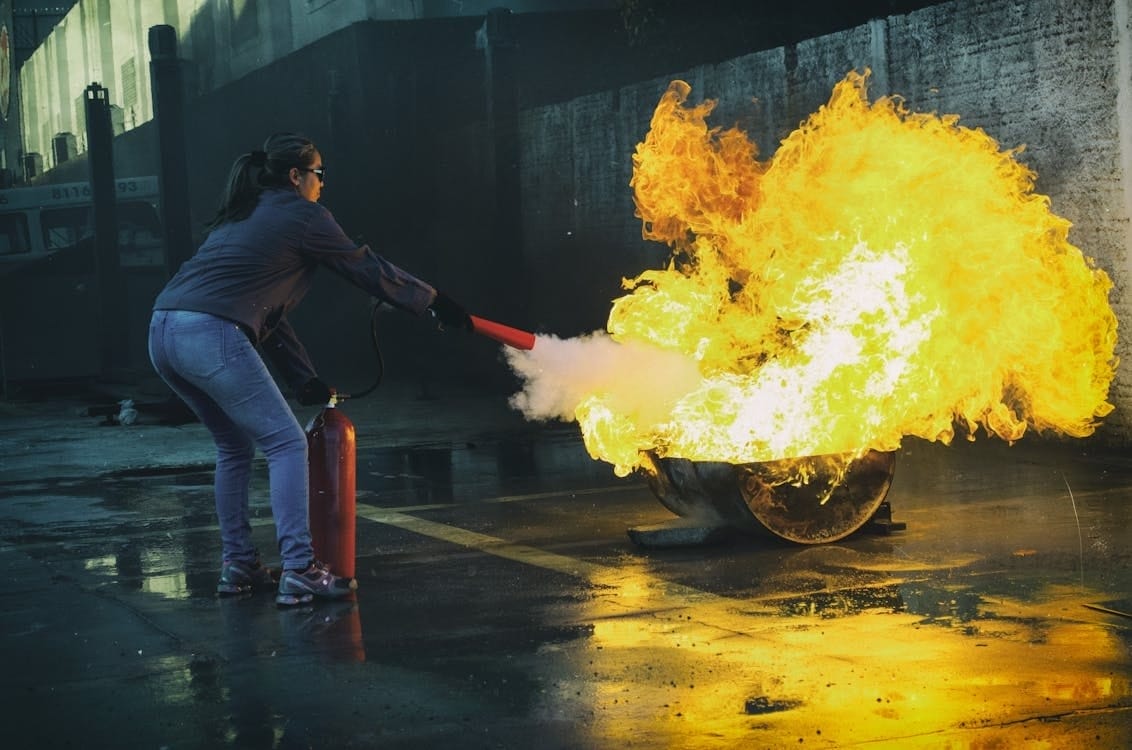
No matter what kind of heater you decide to install in your trailer, it is essential to be prepared for any disasters that may occur. Whenever you install a heater, there is a risk of fire.
For your safety and that of anyone else using the trailer, ensure that you take the following safety precautions:
- Install a smoke alarm within the trailer to allow you in the case of fire or smoke from a heater malfunction.
- Install carbon monoxide detectors, to notify you if there is a buildup of this harmful gas, and ensure that you test them regularly.
- Ensure that you have a working fire extinguisher, and possibly a bucket of sand, for extinguishing fires if they do occur.
- Ensure that you safely store fuels away from the heater, where they cannot become an accelerant if there is a fire.
Electric Heaters
Electric heaters are probably one of the most common choices for heating cargo trailers. Not necessarily because they are the best available option but because they are readily accessible and don’t require any ventilation.
Pros
- They don’t produce any fuse, so they don’t require any additional ventilation.
- You don’t necessarily need to install it in the trailer since many electric heaters are portable, allowing you to use it both within the trailer and other areas as required.
- They are readily available and generally fairly affordable to acquire.
- Most types you can simply plug and play; there’s no complex setup or having to start a fire.
Cons
- They’re not great for off-grid use since you require consistent access to electricity.
- They’re not the greatest option for badly insulated or uninsulated trailers.
- They can be expensive to run since they may use a fair amount of electricity.
- Because they are stand-alone units, a heater lodge enough to heat your cargo trailer efficiently may take up quite a lot of floor space.
- You may require a fairly large unit to heat your trailer; smaller models may not be sufficient for very cold climates.
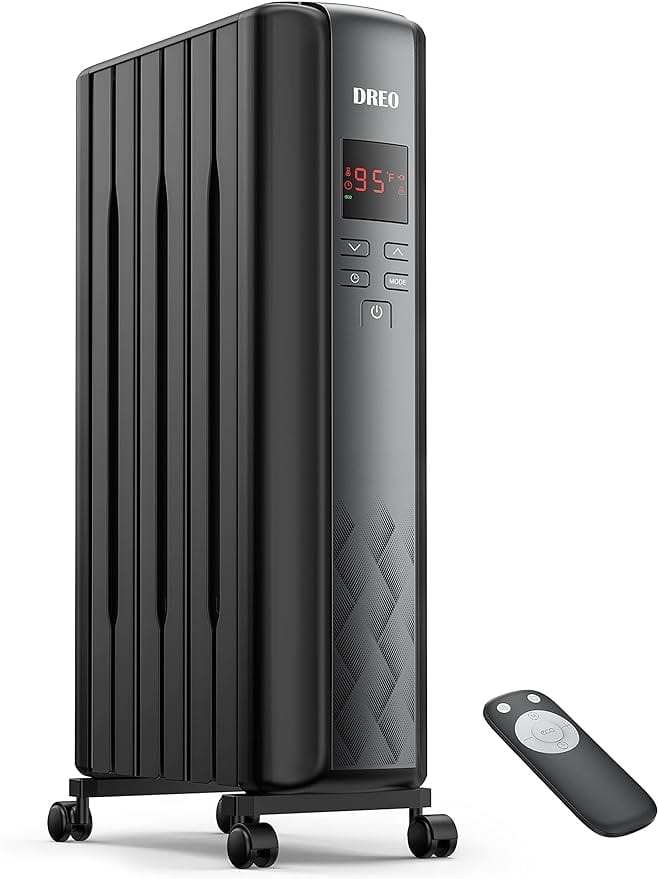
Best Electric Heater for an Enclosed Trailer – Dreo Oil Filled Radiator Heater
What is the best electric heater for an enclosed trailer? This heater offers a range of advantages for heating your cargo trailer. It’s relatively compact, has a digital thermostat for temperature adjustment, and runs silently without producing fumes.
It is effective enough to heat medium to large cargo trailers and comes with a remote control, so you can easily control the temperature (and the heater as a whole) from a distance. The thermostat also offers you a unique level of control over the desired temperature.
This is an ideal part-time heating method when you’re in places with an electricity grid. But, if you go off-grid often or face an unstable electricity supply, consider getting a secondary heater as well.
Propane or Natural Gas Heaters
Propane heaters are another extremely common type of heating for enclosed trailers. In our opinion, this is one of the best ways to heat your cargo trailer since you can use it anywhere at any time.Pros
- They are ideal for off-grid applications as they don’t require an electrical supply or connection to the grid.
- They are generally compact and lightweight, meaning they are easy to install and can often be moved in and out of the trailer as needed.
- Unlike some other heaters, propane heaters produce instant heat and are adjustable.
- Many models have built-in safety features, such as oxygen sensors or protection against tipping over.
- Propane has a high energy density, allowing for extended use of the heater.
Cons
- Propane can be expensive, especially during certain times of the year (mainly winter, and fall to a lesser degree).
- Burning propane produces a lot of carbon dioxide and possibly carbon monoxide, which means these heaters require excellent ventilation.
Best Propane Heater for an Enclosed Trailer – Camco Olympian Wave 3 Catalytic Safety Heater
In terms of propane heaters for cargo trailers, you can’t go wrong with this one. Despite its small and compact size (which is ideal space-saving for small trailers), it produces significant amounts of heat in the highest setting.

Because it is propane-powered, however, you have a reasonable degree of control over the amount of heat it produces. Because it’s a floor-mount model, you don’t have to worry about it falling over or being a fire hazard as long as you don’t place flammable items near it.
Propane is a readily-available fuel source, so it’s easy to use this heater no matter where you are (unlike with an electric heater). Ensuring that your trailer is well-insulated is essential if you want to get the maximum potential effectiveness from this model.
Wood Heaters or Stoves
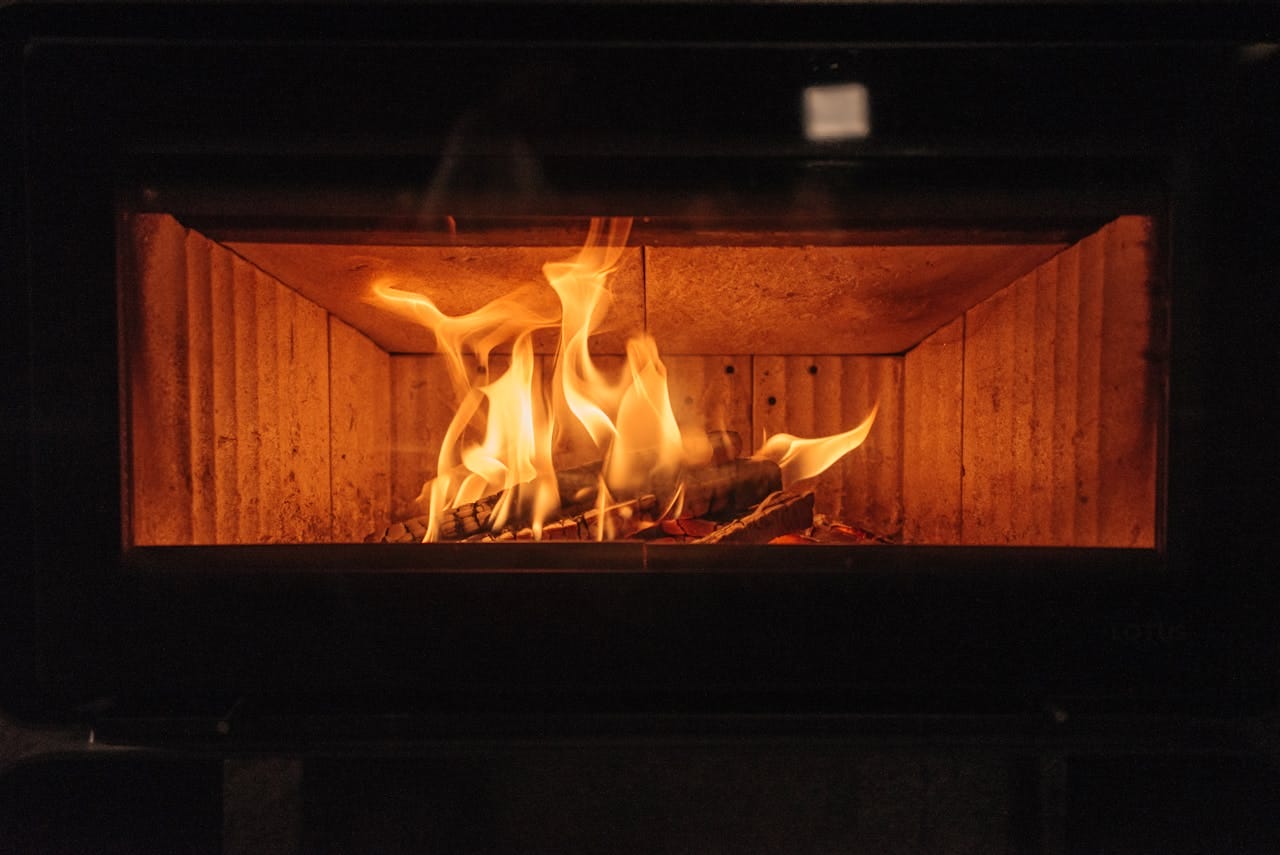
Wood stoves, like propane heaters, are an excellent option for heating cargo trailers since you don’t need access to electricity to use them. However, for various reasons, they haven’t become as popular as electric or propane heaters.
Pros
- Wood stoves offer excellent heat output even in very cold climates.
- They offer versatility because you can use them to boil water and cook food in addition to heating the trailer.
- They can create a very calm and relaxing atmosphere.
- Wood is a renewable resource, unlike diesel or propane.
- When using a wood stove, you won’t generally require a secondary heating device.
Cons
- It can be more difficult to adjust the temperature achieved, since you have to adjust the amount and type of wood used to do so. Both electric and propane heaters offer better heat adjustment.
- As with diesel and propane heaters, wood stoves produce fairly high amounts of carbon dioxide and monoxide, resulting in a need for better ventilation.
- Depending on the quality and type of wood used, these stoves may produce quite a lot of water vapor during combustion, resulting in high levels of condensation within the trailer.
- The initial purchase and installation of these devices may be fairly expensive.
- They take up quite a lot of space within the trailer, limiting available space for other uses.
- They must be cleaned and maintained regularly.
- It can sometimes be difficult or take a lot of effort to source wood for fuel.
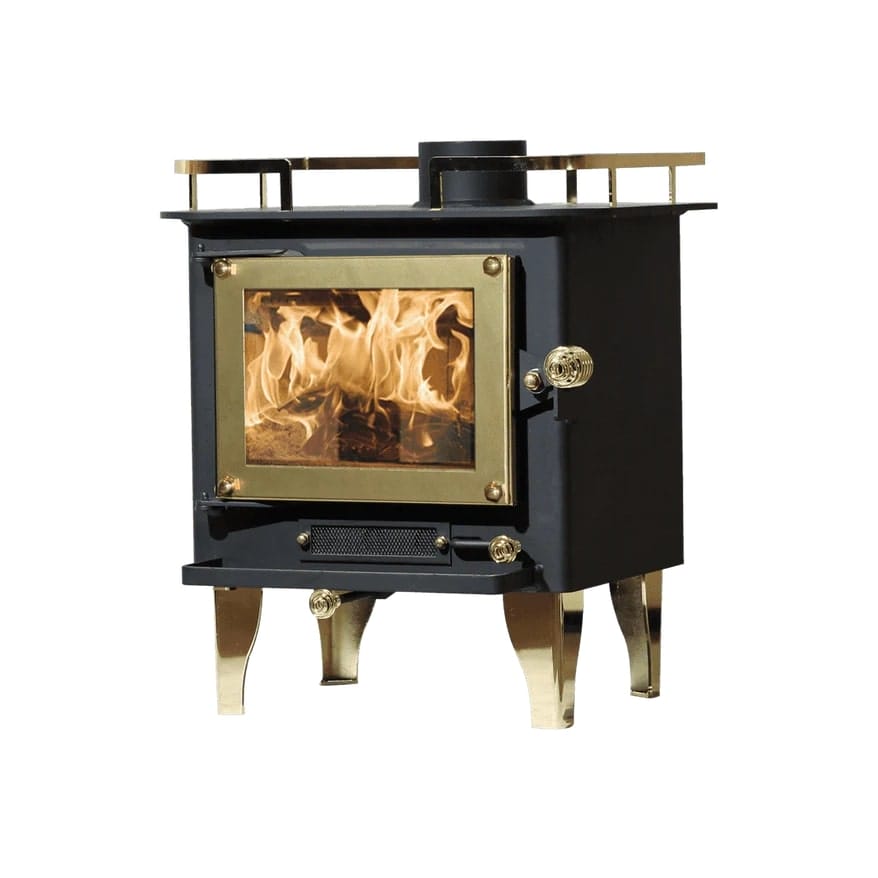
Best Wood Stove/Heater for an Enclosed Trailer – Cubic Mini
One of the main complaints that many people have about using a wood stove in a cargo trailer is that they take up large amounts of space. In the case of the Cubic Mini, that isn’t a factor.
These small, compact, wood stoves don’t take up very much space, but they produce a surprising amount of heat. Many users say that these heaters produce sufficient heat to warm even large trailers, sometimes to excess.
And for fuel, you can use any sort of combustible wood. From wood pellets to small logs, you can source any kind of safe, non-toxic wood. The Cubic Mini is also relatively easy to install when compared to many other wood stove models.
In some cases, you may need to get some assistance to help you install the stove (especially if you’re not particularly handy), but it’s a relatively easy installation.
Diesel Heaters
Diesel heaters share many of the advantages of wood and propane heaters, but they may offer a relatively better fuel consumption.
If you are concerned about condensation and water vapor within your trailer, they are often a great option since these heaters don’t produce any water vapor.
Pros
- These heaters often offer faster and more efficient heating when it comes to large trailers.
- There are some arguments as to whether or not diesel is a cheaper fuel. It probably depends on location, as some areas have an abundance of wood and/or propane.
- Diesel is generally a relatively accessible fuel in most areas.
- Unlike wood and propane heaters, diesel heaters do not produce condensation.
Cons
- They may cause a more distinct or stronger odor when compared to some other heater types.
- It is not easy to DIY install these heaters, and you may need to pay for installation.
- They are generally more expensive than the other types of heaters.
Best Diesel Heater for an Enclosed Trailer – Hcalory TB2 Diesel Heater
The Hcalory ToolBox 2 Diesel Heater offers a range of benefits in terms of portability. Since diesel is readily available, you can easily use this heater anywhere.
And with this device’s low fuel consumption (as low as 0.036-0.1 gallons per hour), your fuel consumption will be much lower.
Most users report excellent heating capabilities, and this device works well for heating even medium to large rooms and trailers.
You can easily run the digital components of this heater from a 12V power source, allowing you to use it anywhere, thanks to solar power and other alternative energy sources.
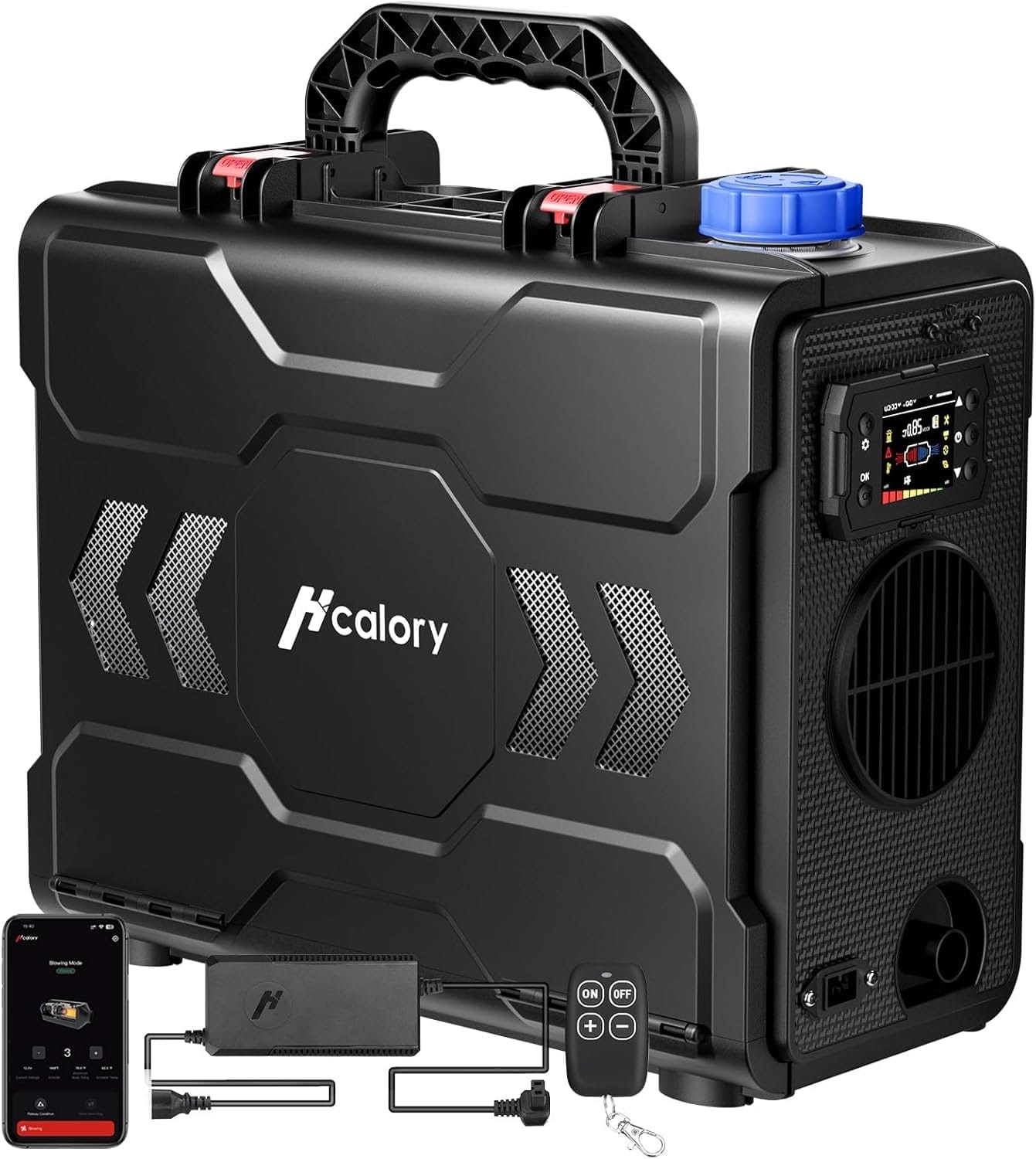
What makes this heater more convenient than many other diesel heaters is the fact that it’s incredibly compact. As a result it takes up less space, and you can easily control it from a distance thanks to the app integration.
Final Thoughts on Trailer Heaters
As you can see, while there are several considerations that you need to take into account when deciding on a type of heater for your cargo trailer, it isn’t as complex as you may have thought.
Remember to consider the size of your trailer, the insulation of your trailer, and the ventilation of your trailer, and you should be able to make a wise heater choice with relative ease.
If you want the freedom of not needing electrical connection to heat your trailer, then consider a gas or wood-powered heater. However, if you don’t want to deal with the ventilation aspects that come with combustion heaters, then electric heaters are probably your best bet.
In the end, it mainly comes down to your requirements and preferences. Fortunately, there are many different heating options for enclosed cargo trailers, so you should be able to find exactly what you need without too much effort.
Of course, if you purchase a custom cargo trailer, you can request for heating to be installed from the beginning.
If you’re in the market for a heated cargo trailer, reach out to us, and we can discuss the possibilities.
Sources
- How to Heat A Cargo Trailer in the Winter (Propane, Diesel Heaters, or a Wood Stove?), https://livingtinywithawolf.com/how-to-heat-a-cargo-trailer/
- Trailer heater, https://www.hardcoresledder.com/threads/trailer-heater.1881460/
- Heater for enclosed trailer, https://www.hunttalk.com/threads/heater-for-enclosed-trailer.300930/



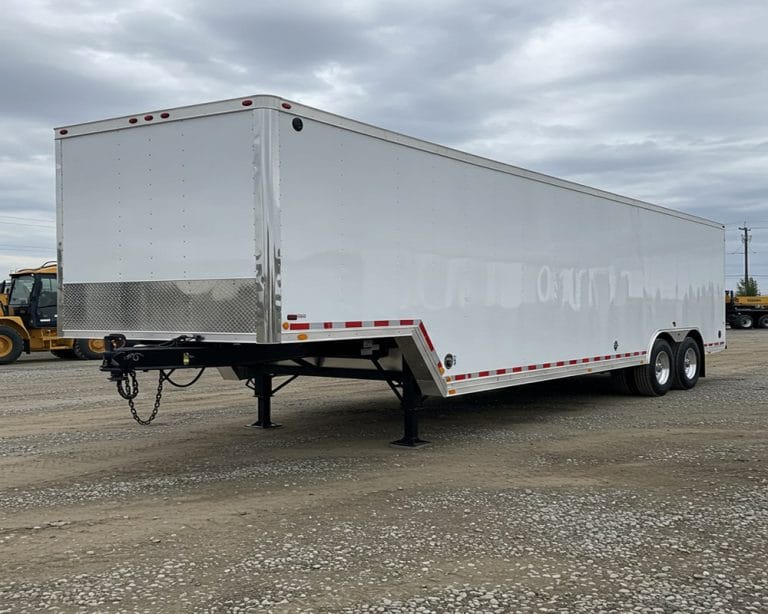
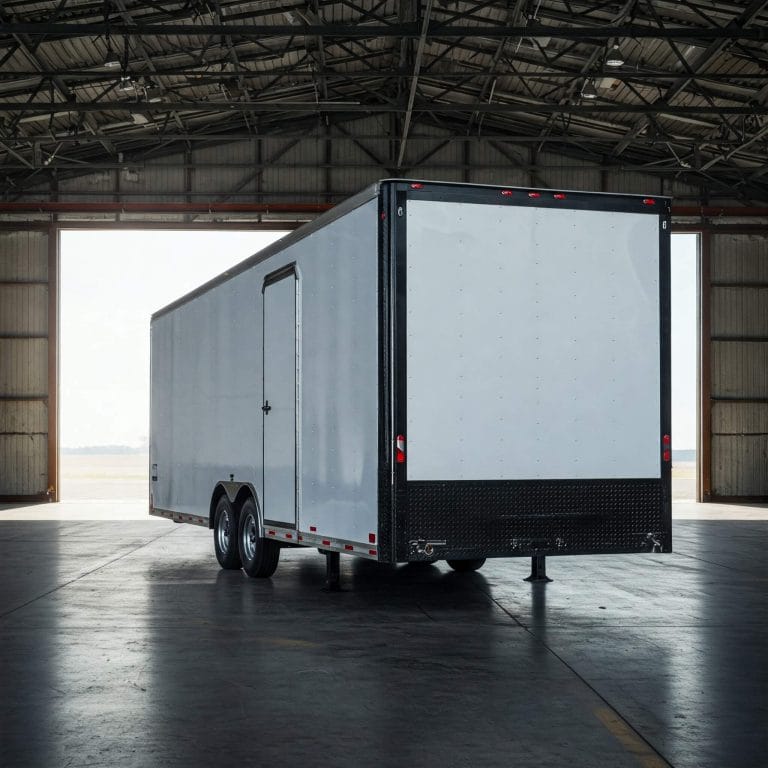
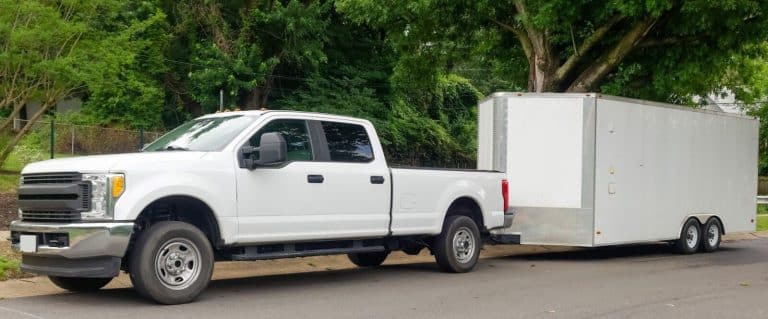
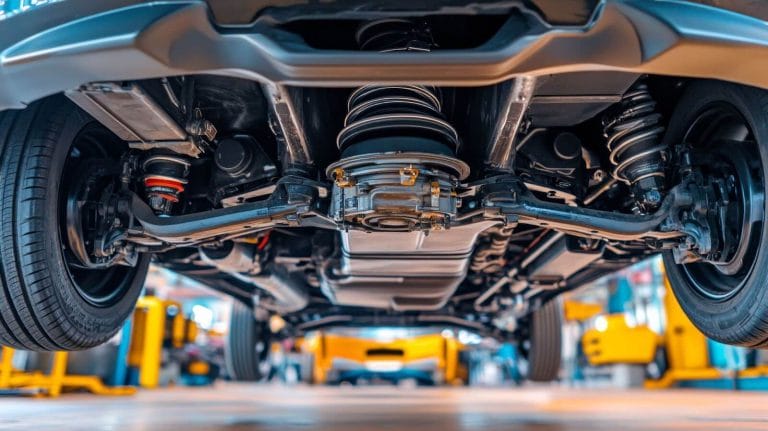
![Two men shaking hands]](https://www.milltrailers.com/wp-content/uploads/2025/02/Two-men-shaking-hands-768x431.jpg)
